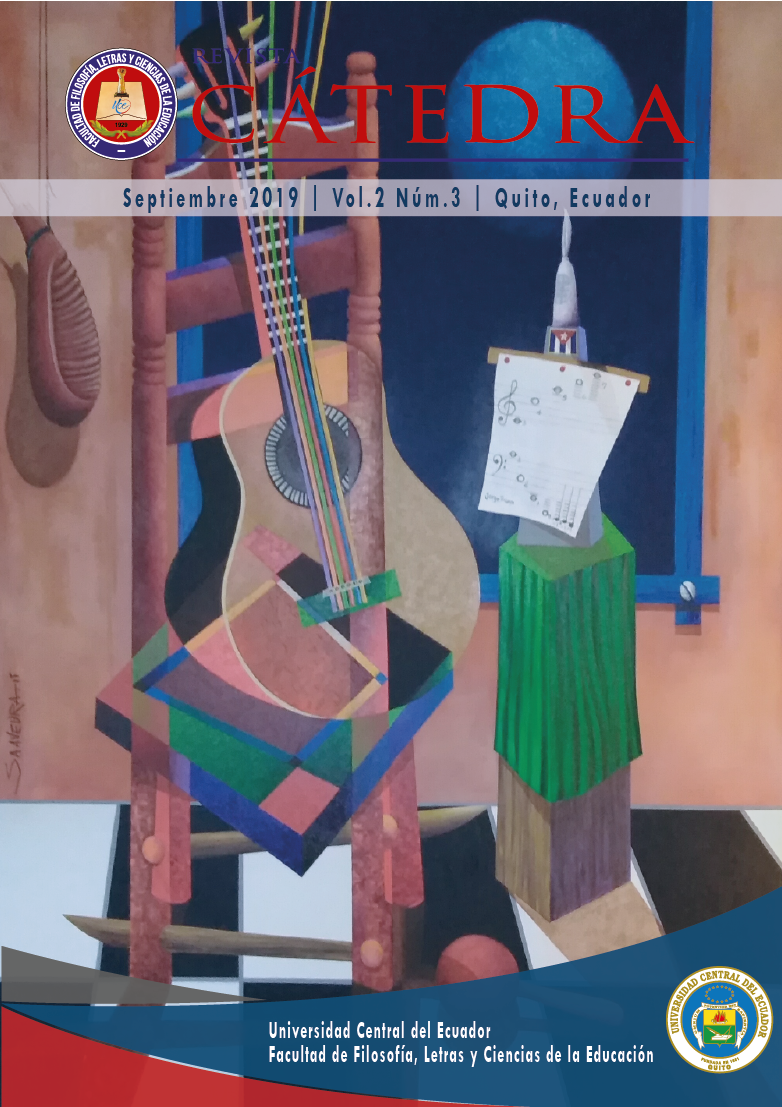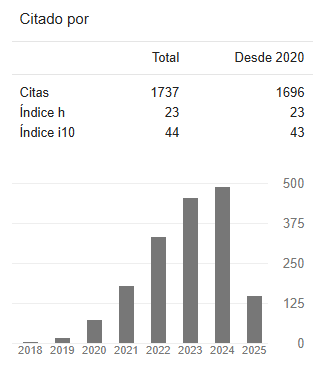Academic program redesigns in careers: an open dialogue in the Faculty of Philosophy, Letters and Education Sciences
DOI:
https://doi.org/10.29166/catedra.v2i3.1683Keywords:
teaching, research, pre-professional practice, curricular redesignAbstract
The purpose of the study was to identify the perceptions of students and teachers about the implementation of the academic program redesigns of the Faculty of Philosophy, Letters and Education Sciences of Universidad Central del Ecuador, considering that the redesigns aim to develop new capacities in the students of the Faculty, framed in the three substantive elements of education teaching, research, and connection with society, which express serious limitations in the institutional intentionality of reorienting the process of professional training in the eight education careers of the faculty. The methodology used was qualitative, exploratory and descriptive, qualitative and quantitative techniques were used, for which a Likert scale survey form and a focal group guide were elaborated, aspects were considered as participation of the educational community in the elaboration and implementation of curricular redesigns; the development of teaching, research and pre-professional practice in the redesigns; the contribution of the integrating project of knowledge and the practices of application and experimentation to the graduation profile. The results show that there was limited participation of the actors, deficient pedagogical and curricular orientation in the elaboration and implementation of the redesign, expressed in substantial weaknesses in the fields of specialty and teacher training. There are subjects in the curriculum with a high workload and without any relationship in the specialization field, there is also evidence of a lack of understanding of the scope and objectives of the integrating knowledge project. One of the most important conclusions points to an integral reform to the curricular redesign of the careers that responds to the graduation profile in coherence with the guidelines of the Faculty.
Downloads
References
Ander-Egg, E., (1995). Técnicas de investigación social, 23a. ed., Argentina.
Ayala, E. (2013). La investigación científica en las universidades ecuatorianas. Anales, 57(1), 61-72.
Barreno, S., Haro, O., y Flores, P. (2019). Relación entre rendimiento académico y asistencia como factores de promoción estudiantil. Revista Cátedra, 2(1), 44-59
Barreno, S., Haro, O., Llumiquinga, R. y Taco, F. (2017). Universidad y sociedad. Quito Ecuador: Ediciem.
Carrión, F. (2002). Documento de Extensión Universitaria. Quito: Facultad de Filosofía, Letras y Ciencias de la Educación.
Carrión, Durán, Montaluisa y Rodríguez (2018). Propuesta educativa. Quito: Facultad de Filosofía, Letras y Ciencias de la Educación.
Cisterna, C., Soto, V. y Rojas, C. (2016). Rediseño curricular en la Universidad de Concepción. Calidad en la educación, 44(1), 301-323.
Consejo de Educación Superior, (2019). Reglamento de Régimen Académico. Gaceta Oficial del Consejo de Educación Superior. Quito, Ecuador.
Comisión de innovación - Facultad de Filosofía, Letras y Ciencias de la Educación, (2019). Propuesta Educativa. UCE, Quito, Ecuador
Durán J. (2016). Las escuelas Zapatistas. Quito – Ecuador: Universidad Central del Ecuador - Asoprofi.
Durán J., Rodríguez F., Carrión F. y Montaluisa A. (2018). Construcción de la propuesta educativa. Quito - Ecuador. Universidad Central del Ecuador.
Hernández R., Fernández C. y Baptista M. (2014). Metodología de la Investigación. México. Sexta edición McGRAW-HILL
Kopnin, P. V. (1966). Lógica Dialéctica. Ed. Grijalbo. México.
Larrea, E. (2015). El currículo de la educación superior desde la complejidad sistémica. Recuperado de http://www.ces.gob.ec/doc/Taller-difusion/SubidoAbril-2015/curriculo_es-sistemico%20-%20e%20larrea.pdf
Unesco. (2009). Conferencia mundial de la educación superior. Paris Francia. Recuperado de http://www.unesco.org/education/WCHE2009/comunicado_es.pdf
SENESCYT. (2013). Proyecto integrador de saberes (PIS). Quito - Ecuador: SNNA.
Torres, J., (1998). Globalización e Interdisciplinariedad: el currículum Integrado. Ed. Morata. Madrid.
Downloads
Published
Versions
- 2020-09-03 (2)
- 2019-09-27 (1)









